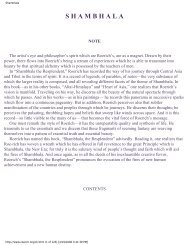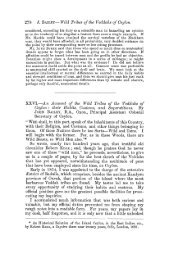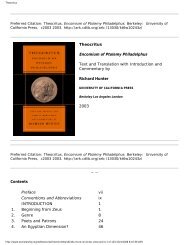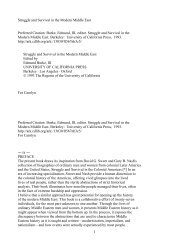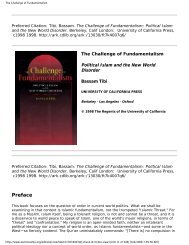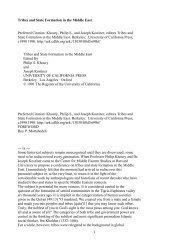Between Two Worlds Kafadar.pdf
Between Two Worlds Kafadar.pdf
Between Two Worlds Kafadar.pdf
Create successful ePaper yourself
Turn your PDF publications into a flip-book with our unique Google optimized e-Paper software.
any more useful of course. But to establish such a dominance, one first has to<br />
assume the existence of competing views and trace their interrelations. There is<br />
no room for such an analysis in the schema of a unidirectional, step-by-step<br />
development of ideology that does not take into consideration the complexity of<br />
early Ottoman social structure and the tensions within it,<br />
Moreover, to liken Apz to Einhard is unjustified and problematic because the<br />
former is not a court historian. Though he does sing the praises of many<br />
achievements of the Ottoman enterprise, his chronicle is also informed by a<br />
critical streak that he shares, in varying degrees, with Urnç and the anonymous<br />
chroniclers. Taken altogether and treated systematically, Apz's criticisms<br />
consistently reflect the worldview of a certain milieu which, particularly after<br />
the conquest of Constantinople and the adoption of the imperial project, stood<br />
outside and in some opposition to the Ottoman court, or at least the dominant<br />
centralist position upheld by most sultans and statesmen of the classical age.<br />
Apz's personal and ideological connections to the gazi milieu have long ago been<br />
identified.[114] It may well have been true that Apz decided to publish his<br />
chronicle due to Bayezid's demand after 1484 to have the deeds of his ancestors<br />
collected and told. This does not predicate either an ideological homogeneity or<br />
an official character in the chronicles. Apz and the writers of the anonymous<br />
chronicles may have modified the final versions of their books to some extent to<br />
protect themselves from possible danger; they were also probably influenced to a<br />
significant extent by the official ideology emerging throughout the fifteenth<br />
century. Such compliances and convergences do not undermine their distinct<br />
position, however. The specific criticisms in these chronicles consistently<br />
reflect the views of the frontier warriors as opposed to the emerging central<br />
state. Compare the accounts of the establishment of the pençik system (whereby<br />
the Treasury's right to one-fifth of the gaza booty was extended to include<br />
slaves), the objections to Bayezid I's lifestyle, the murdering of Haci Ilbegi ,<br />
the application of a new monetary system by Çandarli Halil Pasa , and the<br />
policies of Mehmed the Conqueror in terms of property rights and rents after the<br />
conquest of Constantinople. All of these cannot be dismissed as slips or as a<br />
mere show of righteousness.<br />
And why should it be thought accidental that Apz had access to Yahsi Fakih's<br />
chronicle and decided to rely on these traditions in his own book? Does he not<br />
openly state his source rather than try to conceal it?<br />
― 101 ―<br />
In fact this passage and many others interspersed in his chronicle that tell us<br />
of his friends and acquaintances who often serve him as oral sources provide the<br />
reader with many precious dues about Apz's social network.<br />
Growing up in a village of Amasya during the turbulent years of the Interregnum<br />
(1402-13) when a century's worth of Ottoman acquisitions seemed to be up for<br />
grabs, Apz apparently had a knack for being where the action was. In his teens,<br />
he tagged along with the army of Prince Mehmed , the eventual winner. The young<br />
dervish found himself on the winning side probably for no other reason than that<br />
they were both based in the same area. While the forces of the future sultan<br />
were proceeding to what proved to be the final showdown with the only other<br />
90




